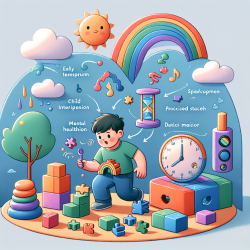Introduction
The COVID-19 pandemic has brought unprecedented challenges, particularly in the realm of children's mental health. School closures, a necessary measure to curb the virus's spread, have inadvertently impacted children's mental and behavioral health. The SAPRIS project, a comprehensive study conducted in France, sheds light on these impacts and offers insights that can guide practitioners in enhancing their interventions for children.
Understanding the SAPRIS Project Findings
The SAPRIS project examined the mental health of children aged 8-9 during the school closures in France in 2020. Key findings highlighted that:
- Children's sleeping difficulties were strongly associated with hyperactivity-inattention and emotional symptoms.
- Boys were more likely to exhibit hyperactivity-inattention symptoms, while girls showed more emotional symptoms.
- Socioeconomic factors, such as modest income and changes in parents' work situations, were linked to increased emotional symptoms.
- Children who had access to specialized care before the pandemic and lost it during school closures faced higher risks of hyperactivity-inattention.
Implications for Practitioners
Practitioners can leverage these findings to tailor their approaches, ensuring that interventions are data-driven and effective:
- Focus on Sleep Hygiene: Addressing sleep difficulties can be a crucial step in managing both hyperactivity and emotional symptoms. Practitioners should incorporate sleep assessments and interventions into their routine evaluations.
- Gender-Specific Strategies: Given the gender differences in symptom manifestation, practitioners should consider gender-specific strategies in their therapeutic approaches.
- Socioeconomic Sensitivity: Practitioners must be sensitive to the socioeconomic contexts of the children they serve. Understanding these dynamics can help in designing interventions that are both feasible and impactful.
- Continuity of Care: Ensuring continuity of specialized care, even during disruptions like school closures, is essential. Teletherapy and other remote interventions can be pivotal in maintaining this continuity.
Encouraging Further Research
While the SAPRIS project provides valuable insights, it also highlights the need for further research. Practitioners are encouraged to engage in or support research efforts that explore:
- The long-term impacts of school closures on children's mental health.
- Effective remote intervention strategies for maintaining continuity of care.
- The role of socioeconomic factors in children's mental health outcomes.
Conclusion
The SAPRIS project underscores the complex interplay between school closures, socioeconomic factors, and children's mental health. By integrating these insights into practice, practitioners can enhance their interventions and support better outcomes for children. To read the original research paper, please follow this link: Children's mental and behavioral health, schooling, and socioeconomic characteristics during school closure in France due to COVID-19: the SAPRIS project.










